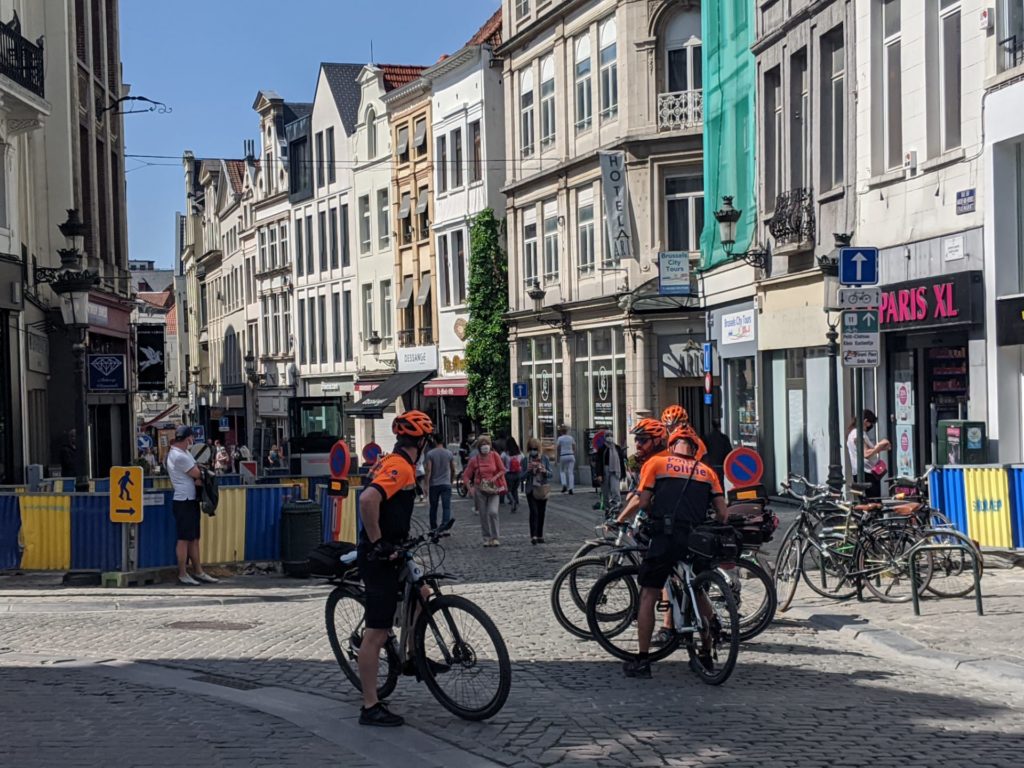As the relaxed measures in Phase 2 of Belgium's deconfinement plan allow an increasing number of reasons to go out, the Brussels police have a harder time making sure people are following them.
Since Monday 18 May, schools, many museums and cultural attractions, zoos, markets and 'contact professions' such as hairdressers have been open. A week earlier, on Monday 11 May, all shops were allowed to reopen their doors as well.
This means that visiting a museum and going shopping are now valid reasons to be in the public space, provided masks are worn if necessary, and the social distance is adhered to. Since people can also visit up to four other people, no matter where they live in Belgium, police have reduced their checks on "non-essential journeys," but have switched to monitoring the ban on gatherings.
"If we get a call that the ban on gatherings is not being respected, we go and intervene. Then, the situation temporarily improves, people get too close to each other again after a while, regardless," Olivier Slosse, spokesperson for the Brussels Capital-Ixelles police zone, told The Brussels Times. "We have to remind people of the rules. Constantly," he added.
"I want to say that it is a constant game between the citizens and the police, but the stakes are too high to call it a game," said Slosse. "However, we do need to play it, and keep an eye on the people permanently," he added.
Related News
- Second coronavirus peak not certain, says leading intensivist
- Place De Brouckère to become fully car-free from May 25
- Confirmed: People can visit their second home again
The basic rule is still that people should stay at home as much as possible, and should only go out for essential journeys. "However, many things are allowed again now. The pressure on public spaces is increasing," Slosse said. "We try to solve this as much as possible by implementing walking directions, for example," he added.
However, some streets are so narrow that this solution is not possible, and even keeping to the regular social distancing measures becomes difficult. Several Brussels' communes, such as Etterbeek and Saint-Josse-ten-Noode, have even made wearing a face mask mandatory in several of these streets and shops on their territory.
It is up to the traders and retailers to make sure that social distancing is possible. If a store cannot guarantee the appropriate space for its clients, it has to remain closed.
"We have also emptied out some parking spaces in several streets, to make sure that there is enough space to walk normally," said Slosse. "In some neighbourhoods, like the Matongé district in Ixelles, for example, the sidewalks are not always wide enough," he added.
In most cases, it is not so much that people do not want to listen, but that they are careless, or do not pay enough attention. "When people hear the announcements of measures that will go into force soon, they think that everything is allowed again," Slosse added.
Additionally, the police check where most problems occur on a day-to-day basis, to keep their finger on the pulse. "In those areas, we attempt to be present a lot, mainly as a prevention factor. To encourage people to follow the rules," he said.
As very warm weather has been forecast for the long weekend, the police are particularly monitoring the parks in the city closely. " The will to go outside is great. People are social creatures, so it makes sense," Slosse said.
Maïthé Chini
The Brussels Times

